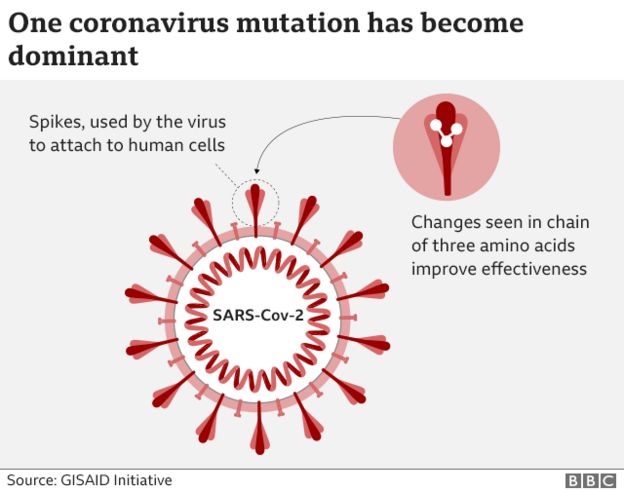The coronavirus that is now threatening the world is subtly different from the one that first emerged in China.
Sars-Cov-2, the official name of the virus that causes the disease Covid-19, and continues to blaze a path of destruction across the globe, is mutating.
But, while scientists have spotted thousands of mutations, or changes to the virus's genetic material, only one has so far been singled out as possibly altering its behaviour.
The crucial questions about this mutation are: does this make the virus more infectious - or lethal - in humans? And could it pose a threat to the success of a future vaccine?
This coronavirus is actually changing very slowly compared with a virus-like flu. With relatively low levels of natural immunity in the population, no vaccine and few effective treatments, there's no pressure on it to adapt. So far, it's doing a good job of keeping itself in circulation as it is.
The notable mutation - named D614G and situated within the protein making up the virus's "spike" it uses to break into our cells - appeared sometime after the initial Wuhan outbreak, probably in Italy. It is now seen in as many as 97% of samples around the world.
Evolutionary edge
The question is whether this dominance is the mutation giving the virus some advantage, or whether it's just by chance.
Viruses don't have a grand plan. They mutate constantly and while some changes will help a virus reproduce, some may hinder it. Others are simply neutral. They're a "by-product of the virus replicating," says Dr Lucy van Dorp, of University College London. They "hitch-hike" on the virus without changing its behaviour.
The mutation that has emerged could have become very widespread just because it happened early in the outbreak and spread - something known as the "founder effect". This is what Dr van Dorp and her team believe is the likely explanation for the mutation being so common. But this is increasingly controversial.
A growing number - perhaps the majority - of virologists now believe, as Dr Thushan de Silva, at the University of Sheffield, explains, there is enough data to say this version of the virus has a "selective advantage" - an evolutionary edge - over the earlier version.
Though there is still not enough evidence to say "it's more transmissible" in people, he says, he's sure it's "not neutral".
When studied in laboratory conditions, the mutated virus was better at entering human cells than those without the variation, say professors Hyeryun Choe and Michael Farzan, at Scripps University in Florida. Changes to the spike protein the virus uses to latch on to human cells seem to allow it to "stick together better and function more efficiently".

But that's where they drew the line.
Prof Farzan said the spike proteins of these viruses were different in a way that was "consistent with, but not proving, greater transmissibility".
Lab result proof
At the New York Genome Center and New York University, Prof Neville Sanjana, who normally spends his time working on gene-editing technology Crispr, has gone one step further.
His team edited a virus so that it had this alteration to the spike protein and pitted it against a real Sars-CoV-2 virus from the early Wuhan outbreak, without the mutation, in human tissue cells. The results, he believes, prove the mutated virus is more transmissible than the original version, at least in the lab.
Dr van Dorp points out "it is unclear" how representative they are of transmission in real patients. But Prof Farzan says these "marked biological differences" were "substantial enough to tilt the evidence somewhat" in favour of the idea that the mutation is making the virus better at spreading.
Latest Stories
-
AFCON 2025Q: Cameroon complete unbeaten qualifying run, Kenya and Namibia bow out
6 mins -
AFCON 2025Q: Tanzania defeats Guinea to secure AFCON ticket
16 mins -
Ghana embarks on polio vaccination campaign amid rising cholera cases
30 mins -
Election 2024: NCCE urges political parties to foster peaceful campaigns
34 mins -
We have disappointed the country – Black Stars team manager, Ameenu Shardow
38 mins -
‘I never thought of playing for Germany even though I was born there’ – Otto Addo
45 mins -
Samira Bawumia launches second literature anthology, ‘We Move: Ghanaian Dream in Motion’
46 mins -
Jobberman CEO charges employers to create culture of excellence in today’s competitive market
55 mins -
A vote for Bawumia an endorsement of hardship and corruption – Mahama
1 hour -
Access Bank launches ‘Power of 100 Africa’ to celebrate trailblazing women across continent
1 hour -
Monuments of Leadership: Honouring Ghana’s presidents and the debate on legacy
1 hour -
Fortitude Child Support Foundation, Shai Osudoku District Hospital create prematurity birth awareness in 2-day campaign
1 hour -
NDC calls for immediate removal of Brigadier Gen. Opoku
1 hour -
CIMG holds 34th AGM
2 hours -
Healthcare Education: Adapt to AI to improve educational outcomes; patient-centered care
2 hours

